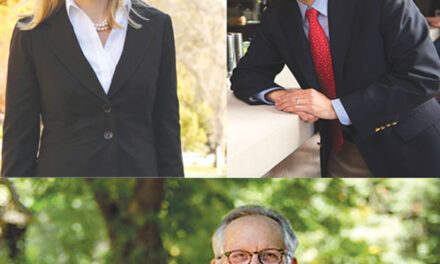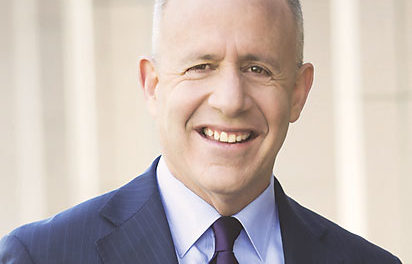Up In Smoke
How city abuses its own pot rules
By Craig Powell
December 2019
Editor’s Update: In November 2020, City Auditor Jorge Oseguera issued a report on the city’s cannabis storefront dispensary permitting process. The report describes how a group of five business partners legally consolidated ownership of nine of the city’s 30 cannabis retail dispensaries. The partners are Garib Karapetyan, Joe Karapetyan, Gevorg Kadzhikyan, Gayk Serobyan and Grach Serobyan. While the audit alleged no wrongdoing by the business partners, it said the city code allowed a “loophole that dispensary owners could exploit to circumvent” rules against cannabis permit transfers. The auditor advised the City Council to tighten code language about ownership and transfers. The partners continue to hold cannabis permits in Sacramento.
Ukrainian-born Andrey Kukushkin is a man in the middle. He has roles in two scandals, one consuming Washington, D.C., and the other rocking Sacramento City Hall and the local regulated pot industry.
Kukushkin is one of four men indicted by federal prosecutors for allegedly trying to channel offshore money into the campaigns of U.S. politicians to gain entry into pot industries in Nevada, New York and other states.

Two of the other men indicted, Lev Parnas and Igor Fruman, are associates of President Trump’s lawyer, Rudy Giuliani, and allegedly have been helping Giuliani press the Ukrainian government to initiate an investigation into Hunter Biden’s role as a highly paid board member of a Ukrainian firm.
Meanwhile, in Sacramento a second scandal has been brewing. In a major story broken by The Sacramento Bee, it turns out that Kukushkin is a partner in a Sacramento pot dispensary with Garib Karapetyan, who apparently controls eight of Sacramento’s 30 pot dispensaries, despite a city ordinance that forbids anyone from acquiring more than a 20 percent interest in a cannabis dispensary from another party.
Under the local ordinance, folks leaving the pot business must surrender their licenses to the city. From there, the city is supposed to conduct a lottery to place the license into new hands. In practice, city officials have turned a blind eye to open trading in ownership interests at local dispensaries. It was through such trading that Karapetyan and his partners secured a dominant position in Sacramento.
It also turns out Karapetyan, Kukushkin and partners have given campaign contributions to local politicians, including Mayor Darrell Steinberg and City Councilmember Jay Schenirer.
Schenirer’s former chief of staff, Joe Devlin, served more than two years as the city’s marijuana policy and enforcement manager until May 29, when he was fired, effective immediately, by City Manager Howard Chan, according to a termination letter obtained by the Sacramento Business Journal. Devlin told the Business Journal he resigned.
Why was Devlin fired? Did his dismissal have anything to do with the city’s chronic noncompliance of its own ordinances? City Manager Chan is silent.
In 2017, City Auditor Jorge Oseguera issued a critical report on the handling and oversight of Sacramento cannabis licensing. Several issues he raised are unresolved. In response to recent media coverage, Steinberg directed Oseguera to re-audit the licensing program.
Councilmember Angelique Ashby told the media, “Obvious mismanagement has occurred in our permitting process. Several us on the City Council have raised concerns many times about the lack of integrity and perceived equity in our marijuana permitting system.” Apparently, those concerns fell on deaf ears.
Multiple sources have confirmed that the FBI is investigating whether city officials accepted bribes in the form of campaign contributions in exchange for favorable treatment in dispensary licenses.
Our review of public records show Schenirer collected a total of $5,750 in campaign contributions from Karapetyan and associates, and received a further $11,000 from Karapetyan and friends for an initiative committee Schenirer formed to promote his unsuccessful cannabis tax ballot measure in 2016. Our calculations show Schenirer received a total of $16,750 from Karapetyan and associates.
The Karapetyan group is not the only cannabis player showering Steinberg and Schenirer with cash. Our review of campaign finance filings shows in the most recent elections, Steinberg took in $31,900 from cannabis operators, while Schenirer collected more than $29,000 from the industry.
And that doesn’t count the $63,500 in cash Schenirer collected from nine cannabis contributors to help fund his 2016 cannabis tax ballot measure. The average size of his cannabis contributions for that initiative topped $7,000—more than quadruple the maximum allowed for City Council candidates under local campaign finance laws.
There’s no limit on the amount a contributor can give to a ballot measure committee controlled by a councilmember. This means a donor can influence the City Council by making unlimited contributions to ballot measures sponsored by councilmembers—a huge loophole in our local campaign finance rules.
The city’s “revolving-door” ordinance requires that former employees refrain from lobbying the city on issues over which the employees had responsibility for one year after leaving city employment. To protect the public’s interest, the ordinance should be changed to bar post-employment involvement with any business regulated by the city for two years. And the law should impose a four-year ban against lobbying on issues over which a former employee had responsibility.
Further, employees in an oversight role over regulated businesses should be required to document all contacts with representatives of regulated companies. There should be no after-work, off-the-record connections with folks you regulate.
Let’s liberate the city auditor. Currently, the auditor can only examine a department or program with approval from the City Council. Each year, Oseguera submits a list of audit targets to the council for approval. A better practice would be to give the city auditor free reign to audit any department. This would prevent councilmembers from “protecting” a favored department or program. It would let the auditor do spot audits, which should keep bureaucrats on their toes.
We should prohibit officeholders from taking contributions from any current or prospective licensee, permit holder or city contractor. Frankly, those seeking financial favors from the city have no business greasing the campaign accounts of elected city officials. We need to put an end to the gross conflict of interest of elected officials handing out licenses, permits and contracts to their major campaign contributors.
We should also apply city campaign contribution limits to ballot-measure committees headed by any councilmember. The ability to make unlimited campaign contributions to committees controlled by the mayor or councilmembers is an obvious and abusive end run around the contribution limits that apply to the city’s elected leaders.
Craig Powell is a retired attorney, businessman, community activist and president of Eye On Sacramento, a civic watchdog and policy group. He can be reached at craig@eyeonsacramento.org or (916) 718-3030. Follow us on Facebook, Twitter and Instagram: @insidesacramento.















